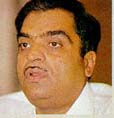Commentary/Vir Sanghvi
The government should not waste its time (and our money) setting up a media empire
 A year or so later, DD3 was revived but by then it had lost its
great advantage. It no longer helped to be terrestrial because
upper middle class households -- the target audience -- had installed
cable connections. Even if you were available to those who only
had aerials, this was no good because most people didn't use their
aerials. They depended on their cable operators to decide what
they would watch.
A year or so later, DD3 was revived but by then it had lost its
great advantage. It no longer helped to be terrestrial because
upper middle class households -- the target audience -- had installed
cable connections. Even if you were available to those who only
had aerials, this was no good because most people didn't use their
aerials. They depended on their cable operators to decide what
they would watch.
And most cable operators decided they didn't want it. DD helped
by putting the channel on a satellite band (in addition to the
terrestrial transmission) that was hard to receive and by getting
the programming mix wrong. Though bands have now been changed
and the programmes reworked, the channel remains little watched.
And all of Doordarshan's worst fears have come true. Satellite
channels do set the agenda. Doordarshan may have the numbers but
decision-makers ignore it. To add insult to injury, STAR Plus
is now doing what Doordarshan intended and its head, R Basu,
even says proudly, 'Our concept is the same as the one we
originally had for DD3.'
Even by Doordarshan's dismal standards, the DD3 saga represents
a foul-up of unparalleled magnitude.
I remind you of all this because there is, at last, some hope
for DD3. In the fuss over the Broadcasting Bill, everyone has
ignored Chand Mahal Ibrahim's announcement that he will float a global
tender and hand DD3 over to a private party.
Ibrahim is still talking about retaining 51 per cent of the equity
but he wants the channel to be managed by the private sector.
The private partner can put on its own programming, install its
own transmitters, staff it with its own people -- and still have
the rights to terrestrial broadcasting.
The principle is clear -- privatise Doordarshan. Allow the private
sector to run a channel with the programming values of Zee TV
or STAR Plus but with the reach of Doordarshan.
This flows directly from the Supreme Court judgment of 1994 (the
ostensible provocation for the Broadcasting Bill) which seeks
to end the government's monopoly of the airwaves. While the draft
Broadcasting Bill wastes too much time trying to control the satellite
channels, it does make some tentative movement towards privatisation.
Sadly, it does not go far enough. There is no justification, for
instance, for government control of the Metro channel. Doordarshan
makes none of the programming on that channel but merely functions
as a leaser of time for private producers. Why keep up the fiction
that it is a Doordarshan channel when it has ceased to be that
in any significant sense?
The privatisation of DD3 is only a beginning. It must be followed
on the rest of the network. Every democratic country has private
terrestrial broadcasters. They are free, but subject to a regulatory
mechanism.
India should follow the global precedents. We can go with the
American pattern where the Federal Communications Commission
gives license to several terrestrial channels. Or we can follow
the British example and institute a system whereby the Independent
Broadcasting Authority awards franchises on a territorial
basis.
Regardless of which model we finally select, we must accept that
the government has no business running anything more than one
public service channel -- DD1. It should not waste its time (and
our money) setting up a media empire. And as the DD3 example shows
us, even when it has the right ideas, there are so many pressures
and vested interests that golden opportunities are certain to be
missed.
Despite Ibrahim's announcement that he will break with precedent,
the political establishment remains notably silent. Even we in
the media have been sidetracked by the Broadcasting Bill's restrictions
on satellite channels. We have failed to see that while it is
important to have free satellite broadcasting, it is much more
important to privatise Doordarshan.
It is up to the media to extract a commitment from all political
parties to the privatisation of DD3. We must also push for a longer
term commitment towards a system of privately-owned terrestrial
broadcasting channels.
Otherwise, Doordarshan will remain our sole terrestrial broadcaster,
always boring, usually inept and only too willing to be abused
by the likes of P V R K Prasad and Narasimha Rao.
Tell us what you think of this column
|





